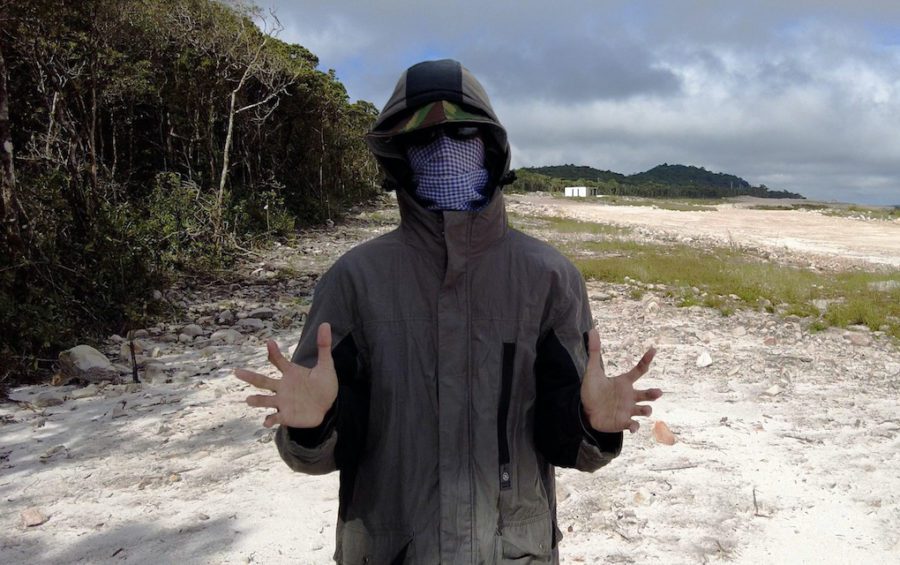Thun Ratha submerged himself in sand up to his chin to protest rampant sand dredging. Phuon Keoreaksmey braved clouds of highway construction dust to highlight worries about Cambodia’s air quality. And Long Kunthea planned a one-woman march to the prime minister’s Phnom Penh home to raise concerns about the infilling of one of the capital’s last remaining natural lakes.
But before Kunthea could take a step in September, all three activists from environmental advocacy group Mother Nature Cambodia were arrested — while in the middle of producing one of their signature web videos.
“That is when we decided to hide our face and our voice,” says Sopheak*, a member of the group who requested the use of a pseudonym due to fear of arrest.
Following a year that saw more than a dozen environmental and youth activists arrested in Cambodia, and many more members of the political opposition jailed, Mother Nature says they will continue to use online videos to challenge the government and private interests over development projects, land allocations and other moves that threaten Cambodia’s natural environment.
People don’t have any voice, and if they dare to [use it] they will be jailed just like my three activists.
But the organization — which has become known for its two- to three-minute exposé videos in which visible members creatively highlight natural resource exploitation and name-and-shame environmental bad actors — says it has had to change tactics.
Since Ratha, 28; Keoreaksmey, 19; and Kunthea, 22, remain in prison on “incitement” charges without trial more than four months after their arrest, and activists have faced harassment and intimidation, Mother Nature has decided to engage in anonymous activism and conceal members’ identities to avoid further arrests.
“We decided not to stop. We will keep doing more videos but in disguise,” says Sopheak, who narrated the second new video released by the group since the arrests — with only his gesticulating hands in plain sight.
“Currently, we have to do our work undercover. We cannot go [somewhere] and say we are from Mother Nature,” the 20-year-old activist adds. “We have to hide our face in the video.”
Under Pressure
The September 2020 arrests are far from the first pressures from authorities faced by Mother Nature, especially during a year that advocates say was notably difficult for human rights defenders in Cambodia, including environmental activists, and also saw rising self-censorship among civil society groups.
Founded in 2013 by Cambodian activists Prum Thomacheat and Sok Chantra and Spanish national Alejandro Gonzalez-Davidson, Mother Nature’s confrontational style and grabbing, exposé web videos have long drawn the ire of Cambodian authorities.
Amid an anti-sand dredging campaign critical of the government and mining companies alike, three Mother Nature activists were arrested in 2015 over the group’s direct actions against dredging vessels, and ultimately found guilty of instigating threats to destroy property, jailed for more than 10 months and ordered to pay a sand-mining firm $25,000. Gonzalez-Davidson was also deported from Cambodia in 2015, and has been consistently denied re-entry, despite also being summoned to court.
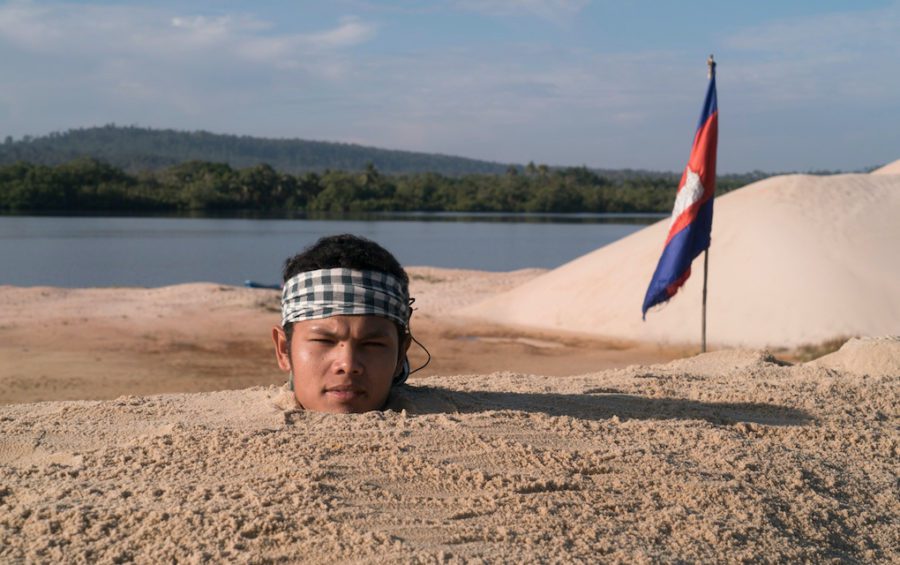
In 2017, two other Mother Nature activists were jailed for filming vessels they suspected of illegally exporting dredged sand, which advocates and fishers say damages river and coastal ecosystems, threatening fish stocks and endangered species. That year, the government revoked Mother Nature’s NGO status at the group’s request, an effort to prevent the repeated harassment and arrests of its members.
In 2018, Mother Nature decided to forgo using an activist in a video about a mangrove forest threatened by sand filling, and instead use a puppet, in part to reduce the chances of further arrests.
In June 2020, members of Mother Nature, including now jailed Keoreaksmey, participated in a bicycle ride from the coastal province of Koh Kong to call for Koh Kong Krao island to be designated as a marine protected area. The biking activists were repeatedly stopped by authorities before the cyclists called off the ride to Phnom Penh.
In September, Mother Nature said its Facebook page was hacked after Ratha, Keoreaksmey and Kunthea were arrested. One of them was a page administrator.
‘Do Something for My Nation’
After his fellow activists were jailed, Sopheak says he committed to becoming a “full member of Mother Nature” so he could continue their work.
About a year ago, he says he started helping Mother Nature with research on a part-time basis. He had worked within civil society and has long been aware of social injustices, but has since transitioned to “civic resistance,” he says.
Our method is to be brave, make videos, to expose the corruption and to let people know what is happening, to pressure the government to stop.
While Cambodia’s rich and powerful, especially those associated with Prime Minister Hun Sen, can find a way to acquire any land they want, others don’t have the power to negotiate or fend off authorities tasked with evicting them, Sopheak says.
“Those people don’t have any voice, and if they dare to [use it] they will be jailed just like my three activists,” he says.
Sopheak joined Mother Nature because they are both nonpartisan and brave, he says.
“They dare to talk [about] what others don’t dare to. They sacrifice most of their time, their safety, their resources to produce videos…[on issues that Cambodian] people deserve to know,” he says.
In a recent Mother Nature video about some 19,000 hectares in a forested national park in coastal Kampot province being privatized, Sopheak is the hidden on-camera talent. His voice in the video is altered, and his face is covered by a hooded jacket, sunglasses and checkered scarf.
Most Cambodians likely did not know the land was allocated to a private company to develop luxury housing units until the group released the video, Sopheak says.
Business tycoon Sok Kong, an associate of the prime minister, was granted a 99-year concession in the mountainous Bokor National Park, according to Mother Nature’s video.
“That’s why there is no surprise that he got a piece of Bokor,” according to Sopheak. Kong’s company Sokimex Investment Group took off in 1996 when it purchased a state-owned oil company following a government privatization policy.
For Sopheak, who calls the granting of public land and natural resources to private firms and individuals unfair, it’s his desire to find justice, especially on behalf of everyday Cambodians, that keeps him committed to Mother Nature.
“I can do something for my nation rather than just standing here and seeing what happens without doing anything,” he says. “I don’t want to see my people be abused.”
Self-Censoring Civil Society
Mother Nature’s first new video after they regained control of their hacked Facebook page in October featured an activist with their voice changed and face concealed by a hooded sweatshirt and a mask of a printed image of Ratha’s face.
The speaker in the video says: “Despite the continued worsening of the human rights situation in Cambodia, MNC activists and the Cambodian people will not be cowed by the state abusing its power to arbitrarily crackdown on our environmental activists.”
But does the group opting for anonymous activism signify retreat?
Sopheak says no, arguing that being anonymous is not the same as being a coward; it’s just a change in tactics.
“Our method is to be brave, make videos, to expose the corruption and to let people know what is happening, to pressure the government to stop,” he says.
By comparison, other advocacy groups in the country have been quiet about the government’s ongoing crackdown on dissenters, Sopheak adds.
Observers say the political and human rights situation in Cambodia deteriorated in 2017, when the main opposition party was banned, independent media outlets were shuttered and civil society groups faced new pressures hindering their ability to hold the government to account.
Indeed, the Cambodian Center for Human Rights (CCHR) says the vast majority of 178 civil society organization and trade union leaders surveyed in late 2020 admit to self-censoring when speaking in public, and only 61 percent report feeling free to exercise their right to freedom of expression.
“This hinders the ability of CSOs to freely and effectively engage in advocacy, as fear of retribution prevents CSOs from meaningfully engaging with relevant decision- and policy-makers to enact sustainable change,” says CCHR’s director Chak Sopheap.
Mother Nature activists were arrested in 2020 on “politically-motivated charges” for exercising their rights, and it is not surprising that advocates, including the environmental group, have adopted new security measures to avoid both physical and legal threats that rights defenders have repeatedly faced, Sopheap says.
Half of the 142 civil society and union leaders surveyed from November 2019 to January 2020 said authorities monitored or surveilled their organization’s activities, according to the latest annual Fundamental Freedoms Monitoring Project report, released by CCHR and two other rights groups. They documented 63 incidents of “unlawful supervision,” including cases of authorities photographing and requesting personal details of staff or activity participants.
Of those surveyed, 29 percent said they did not feel free to exercise their right to peaceful assembly.
I am very scared, and whenever I think about that matter, I feel shaky. …I am afraid that they will punish my daughter more.
Naly Pilorge, director of human rights group Licadho, adds that 2020 was “one of the hardest years for human rights defenders and their families in recent memory.”
From peaceful gatherings to Facebook posts, all manner of expression and assembly are regularly met with arrests and violence, she says.
But activists, many young people, “refuse to stay silent” about key issues affecting Cambodians, such as debt, land grabbing and environmental destruction, Pilorge says.
“Even when they and their friends are thrown in jail and their activities are criminalized, they continue to raise issues at huge personal risk.”
Activists and a family member say they have been intimidated, some online, over the phone and in person, leaving at least one too frightened to be involved with Mother Nature.
In one case, the group deleted a video from their Facebook page because the family of the activist in the video was being harassed, co-founder Gonzalez-Davidson says in a message.
Mother Nature removed the August 2019 video on confiscated wildlife parts at the activist’s request, he says.
Gonzalez-Davidson says the woman who had volunteered to present the video also asked that Mother Nature cut communications with her for fear of being harassed further, although he could not confirm by whom. The imprisoned Ratha and Kunthea had been her contacts. Reporters were unable to contact the woman.
Mother Nature later re-recorded and re-released the video, using the same script and footage from the original, but now starring Ratha.
A Mother Questioned by Police
Kunthea’s mother San Sarorn says she has been questioned by authorities about her daughter’s activism on more than one occasion. The first time was one day after Mother Nature publicly announced her planned one-person demonstration.
On September 1, Mother Nature posted on its Facebook page that in two days Kunthea would walk from Phnom Penh landmark Wat Phnom to Prime Minister Hun Sen’s residence in hopes of meeting with the premier to express concerns over the infilling of Boeng Tamok. Advocates say the natural lake is key to alleviating flooding in the capital, but the government has designated more than 900 hectares of it for state and private development on reclaimed land.
Kunthea intended to raise “issues of flooding in Phnom Penh every time it rains, environmental impact, loss of bird habitats as well as biodiversity,” according to the Facebook post.
The group also called on media and civil society to monitor the solitary march.
Sarorn says on September 2 she was on her way home from buying banana leaves in Kampong Cham province when a local police official stopped her and told her to go to the police station.
At the station, Sarorn, 51, says a man wearing civilian clothes questioned her for about an hour about her daughter, while a uniformed police officer sat nearby listening.
She assumed the man in plainclothes was an official, but he did not tell her his name or position, and she was too nervous to ask, she says.
First, he asked her if her daughter was Long Chantha, Sarorn says. She replied that her daughter’s name was Long Kunthea.
When asked about her daughter’s job, the woman said Kunthea was a teacher. He also asked her Kunthea’s age and how many siblings she has.
The man spoke with her about Facebook posts made by Kunthea, but he did not tell her what the posts were about.
“After he questioned me, he told me to call my daughter to come back home, but he told me not to tell my daughter what I had been questioned about,” Sarorn says.
Sarorn says she later called Kuthea and told her what had happened.
“I am still very scared when thinking about that,” she says.
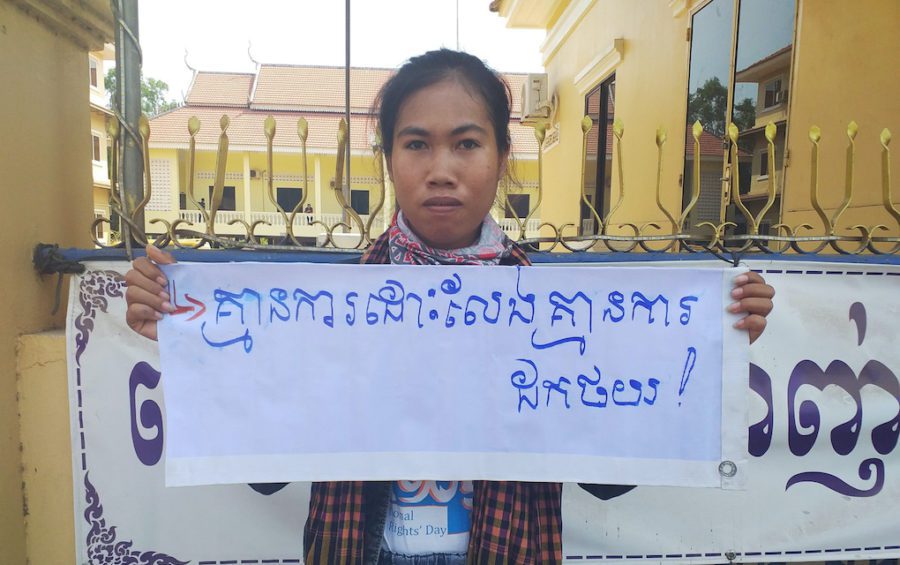
After the incident at the police station, Sarorn’s own mother took her to a Buddhist water blessing ceremony in an attempt to calm her nerves. Sarorn tried to persuade Kunthea to return home to Kampong Cham, but her daughter told her she was too busy.
On September 3, Kunthea, along with Ratha and Keoreaksmey, was arrested in Phnom Penh.
“I did not expect she would be arrested,” Sarorn says of her daughter.
About 10 police officers arrested Kunthea as she was planning to begin her solo march to Hun Sen’s residence, according to a letter from U.N. experts to the Cambodian government made public in early January 2021. Keoreaksmey, who was with Kunthea to livestream the demonstration, was also arrested.
Thun Ratha was detained hours later by around 25 officers, who had surrounded his home for about two hours, the letter says.
Authorities provided no arrest warrant, “padlocked the property shut and posted a letter on the door, stating that the operation was carried out on the basis that Mr. Thun Ratha had ‘published the information without legal permission.’”
But the police letter did not specify what “information” was being referenced, or what “legal permission” was required.
While being questioned, without the presence of his lawyer, Ratha was told that police had “hacked into his Facebook account,” the U.N. letter says.
At least people know what is happening, they see injustice, and I think there will be more people participating in protecting natural resources.
After Kunthea’s arrest, Sarorn says she was questioned a second time by five provincial-level officers. However, this time, she was asked about statements made by Kunthea during a radio interview in which the activist described the questioning of her mother by authorities as “a threat and intimidation.”
Sarorn says she told the provincial officers that local police had not threatened her, but the unidentified man in plainclothes had. The provincial officers, however, told Sarorn that such words were not a threat, she says.
Kampong Cham provincial police chief Em Kosal could not be reached for comment.
Sarorn says she considered the first interrogation, specifically her being told to keep it from her daughter, threatening.
“I am very scared, and whenever I think about that matter, I feel shaky,” Sarorn says. “I am afraid that they will punish my daughter more.”
As of January, Kunthea, Ratha and Keoreaksmey remain in prison and have yet to face trial.
According to Gonzalez-Davidson, Mother Nature has also faced an increasing amount of online abuse, in the form of insults, harassment and threats of activists posted to the group’s Facebook page, since mid-2018.
“Most of the comments that were outright threats were deleted and the users [blocked by page administrators], though in some of the cases these are still on the page as we could not keep up with the amount of abuse,” he says.
Gonzalez-Davidson provided a screenshot of comments on one video about sand dredging that was released in March 2020 and features Kunthea. The comments include insulting language, accusations of “inciting” and calls for the activists’ arrest. Some of the commenters appear to be pro-government trolls, based on their other posts, according to the activist.
‘Terrorist Activities’
Government spokesperson Phay Siphan says Mother Nature uses environmentalism as a means to attack the government and invent false claims, which is why the government cannot work with them.
Siphan said the government, through the Environment Ministry, needed partners to protect the environment, but that did not mean the state gave up its right to pursue development for the benefit of the national economy.
In light of Mother Nature’s move to hide their members’ identities, Siphan says he considers them akin to a terrorist group.
“Any person who tries to conduct terrorist activities, those will be punished according to the law,” he says.
The spokesperson says Mother Nature’s production of advocacy videos is a crime, because, he claims, some videos are exaggerated and intended to incite people against the government, which has been led by Hun Sen for 36 years.
Siphan adds that those who produce videos aimed at destroying their own country will face consequences.
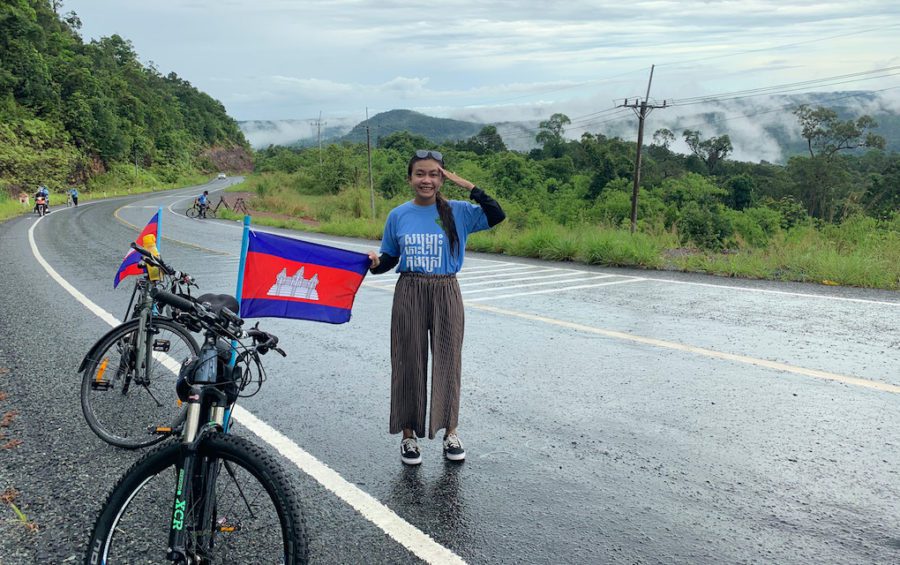
The government strategy is to balance conservation and development, he says, citing how the government curtailed breakneck development in coastal Preah Sihanouk province in recent years to ensure it served the people’s interests.
“Every country does the same,” Siphan says of exploiting land and natural resources. “The U.S. cut a big part of forest, and Canada is the same.”
Foreign activists, such as Gonzalez-Davidson, who lives in Spain, “should pay attention to their own countries and don’t need to come to Cambodia,” he adds.
Siphan says the government supports environmental protection and is taking action against bad actors, but activists have no authority to tell the government how best to sustainably develop the country and meet national needs.
Environment Ministry spokesperson Neth Pheaktra declined to comment on Mother Nature. “It is their job. We don’t have any comment on their work,” he says.
‘Adapting to the Status Quo’
Following the recent arrests, rather than being intimidated, Gonzalez-Davidson says Mother Nature is adjusting its strategies in order to keep exposing environmental crimes.
He says the group disguising its activists is “about adapting to the status quo inside Cambodia,” and “being able to continue working on exposing and stopping some of the crimes against nature that the Hun Sen regime is increasingly committing.”
The group will no longer have anything resembling an office, since authorities previously confiscated everything of value they had in a shared work space, including recording equipment, motorbikes and cash, “under the pretext that it was a ‘crime scene,’” Gonzalez-Davidson says.
Mother Nature has also tightened its digital and physical security policies, as it understands the government is “growing more proficient at conducting cyber-attacks and surveillance against people who dare tell the truth.”
Gonzalez-Davidson declines to say how many people are working with the group from inside Cambodia, or who its specific, mostly foreign-based funders are, citing security concerns.
But in addition to Mother Nature’s full-time “core group,” which is paid a living stipend, he says they also have “dozens of sympathizers.”
Mother Nature has not held physical protests with the involvement of local communities for more than three years, since the risks to those involved are too great, Gonzalez-Davidson adds. It could be years before it is safe to show members’ faces in videos again, he says.
The Mother Nature founder faces charges alongside the group’s three jailed activists, their lawyer Sam Chamroeun says. As of early January, Chamroeun says he was not informed of a trial date.
‘We Cannot Bury Ourselves in the Sand’
Sopheak, the Mother Nature activist, says the group is still observing whether its videos featuring a disguised speaker are as effective as the old ones, which showed their faces.
They have seen some positive signs, such as renewed social media engagement, he says, after their Facebook page lay dormant for more than a month when it was hacked. Still, their last video about Bokor National Park was shared more than 4,000 times, much less than the 18,000 shares of a video released in July 2020 about Phnom Penh’s filled-in lakes and flooding, which featured Kunthea about two months before her arrest.
“What matters is the content, the evidence of the video,” Sopheak says, while acknowledging that the group can no longer include novel stunts in their videos that would attract unwanted attention.
“We cannot bury ourselves in the sand because there will be people seeing it,” he says in reference to their past videos where activists buried themselves while raising concerns about sand dredging. “Our activists will be arrested.”
Sopheak doubts the government will stop exploiting natural resources any time soon. But, he says, Mother Nature’s videos may help the group reach its long-term goal.
“At least people know what is happening, they see injustice, and I think there will be more people participating in protecting natural resources,” Sopheak says. “We also want to inspire people to start talking in a creative way.”
Despite the jailing of his three colleagues, he says the group is undeterred and will continue releasing advocacy videos. On January 13, they released their latest exposé, showing how wastewater is being emptied into an estuary in Kampot province, which Mother Nature says is threatening marine life and locals’ health. The speaker’s face is blurred and their voice altered.
“There are so many injustices in the environmental sector. There will be more videos. We can guarantee that because there are many other members, even if one or two of us is arrested,” Sopheak says.
“We have decided to be brave because we don’t want the next generation to say this generation has done nothing,” he adds.
“We want to see our natural resources preserved, and we don’t want to be cursed by the next generation.”
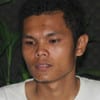 Thun Ratha 28Pat Raksmey, Ratha’s wifePat Raksmey, the wife of jailed activist Thun Ratha, says her husband has not lost his sense of humor in prison.“He makes a lot of jokes with those people imprisoned with him,” she says, explaining that the jokes help him relieve stress.Raksmey, 29, says she visits Ratha regularly, and her husband says he misses her and their 10-month-old child.Ratha and other jailed activists have engaged in peaceful protests inside the prison, according to Raksmey and others.Raksmey, 29, says she visits Ratha regularly, and her husband says he misses her and their 10-month-old child.Beginning in early December, Ratha refused to leave his room from Monday to Thursday, and on Fridays he participated in a hunger strike in which prisoners ate no food all day and meditated silently. They were protesting for the right to use the phone to speak with family, Raksmey says.The woman adds that she has supported Ratha’s activism, but knew that exposing environmental wrongdoing by powerful people could eventually land him in prison.“We protect the environment,” Raksmey says. “We affect the big names and one day they will arrest us.”
Thun Ratha 28Pat Raksmey, Ratha’s wifePat Raksmey, the wife of jailed activist Thun Ratha, says her husband has not lost his sense of humor in prison.“He makes a lot of jokes with those people imprisoned with him,” she says, explaining that the jokes help him relieve stress.Raksmey, 29, says she visits Ratha regularly, and her husband says he misses her and their 10-month-old child.Ratha and other jailed activists have engaged in peaceful protests inside the prison, according to Raksmey and others.Raksmey, 29, says she visits Ratha regularly, and her husband says he misses her and their 10-month-old child.Beginning in early December, Ratha refused to leave his room from Monday to Thursday, and on Fridays he participated in a hunger strike in which prisoners ate no food all day and meditated silently. They were protesting for the right to use the phone to speak with family, Raksmey says.The woman adds that she has supported Ratha’s activism, but knew that exposing environmental wrongdoing by powerful people could eventually land him in prison.“We protect the environment,” Raksmey says. “We affect the big names and one day they will arrest us.” Long Kunthea 22San Sarorn, Kunthea’s motherSan Sarorn, Kunthea’s mother, says she visits her daughter in prison two to three times a month. She has noticed Kunthea appears thinner, but her daughter says she is feeling and eating fine.“Generally, she doesn’t want me to worry about her,” says Sarorn. “In front of me, she smiles and [expresses] no worries. She tends to be afraid that I am worried.”But despite Kunthea’s reassurances, the mother admits she still worries about her jailed daughter.For three days after learning of Kunthea’s arrest, Sarorn says she was shocked and could not eat. “I just heard of the arrest and I did not respond. I got stuck and speechless.”Whenever Kunthea is released, Sarorn says she will not try to stop her daughter from continuing her activism if she wants.“As a mother, I just give birth and her body but what she loves, let her choose it,” says Sarorn.“My daughter as an environmental activist has done nothing wrong. She just loves the environment and nature. … She did not incite. She just protects nature.”
Long Kunthea 22San Sarorn, Kunthea’s motherSan Sarorn, Kunthea’s mother, says she visits her daughter in prison two to three times a month. She has noticed Kunthea appears thinner, but her daughter says she is feeling and eating fine.“Generally, she doesn’t want me to worry about her,” says Sarorn. “In front of me, she smiles and [expresses] no worries. She tends to be afraid that I am worried.”But despite Kunthea’s reassurances, the mother admits she still worries about her jailed daughter.For three days after learning of Kunthea’s arrest, Sarorn says she was shocked and could not eat. “I just heard of the arrest and I did not respond. I got stuck and speechless.”Whenever Kunthea is released, Sarorn says she will not try to stop her daughter from continuing her activism if she wants.“As a mother, I just give birth and her body but what she loves, let her choose it,” says Sarorn.“My daughter as an environmental activist has done nothing wrong. She just loves the environment and nature. … She did not incite. She just protects nature.” Phuon Keoreaksmey 19
Phuon Keoreaksmey 19
Phuon Puthearith, Keoreaksmey’s brotherPhuon Puthearith, 29, says he has visited his younger sister, Phuon Keoreaksmey, several times since she was jailed and is most concerned about her “spirit and health.”Keoreaksmey, a university student majoring in computer science, joined Mother Nature in 2020, Puthearith says.In the crowded prison, she has difficulty breathing amid other prisoners’ cigarette smoke, according to Puthearith.“She has lost all her freedoms and she is not getting used to it because she is young,” he adds. “She keeps saying she feels stressed and doesn’t know when she will be freed.”His sister still wants others to continue advocating against environmental crimes, Puthearith says. He recalls telling her that one day she could be arrested over her advocacy, and her replying that she was still committed.When she was arrested, authorities asked her to agree to stop her activism in exchange for her release, but she declined, Puthearith says, adding that the activists were widely admired.“Cambodian people respect and love them because they do something that many people want to do, but dare not do.”
This article was produced by New Naratif and VOD, who have partnered to publish long-form journalism from Cambodia that empowers our shared community with news and information.
VOD. No part of this article may be reproduced in print, electronically, broadcast, rewritten or redistributed without written permission. VOD is not responsible for any infringement in all forms. The perpetrator may be subject to legal action under Cambodian laws and related laws.


